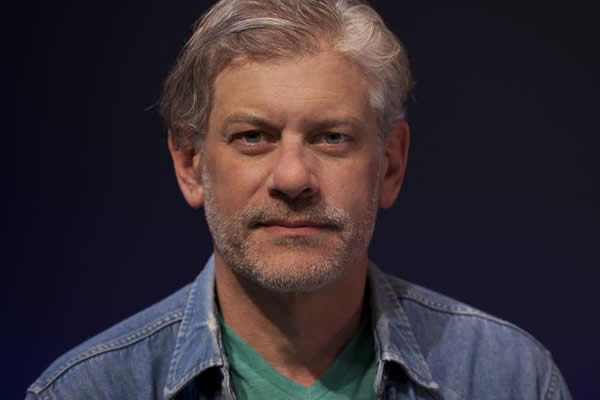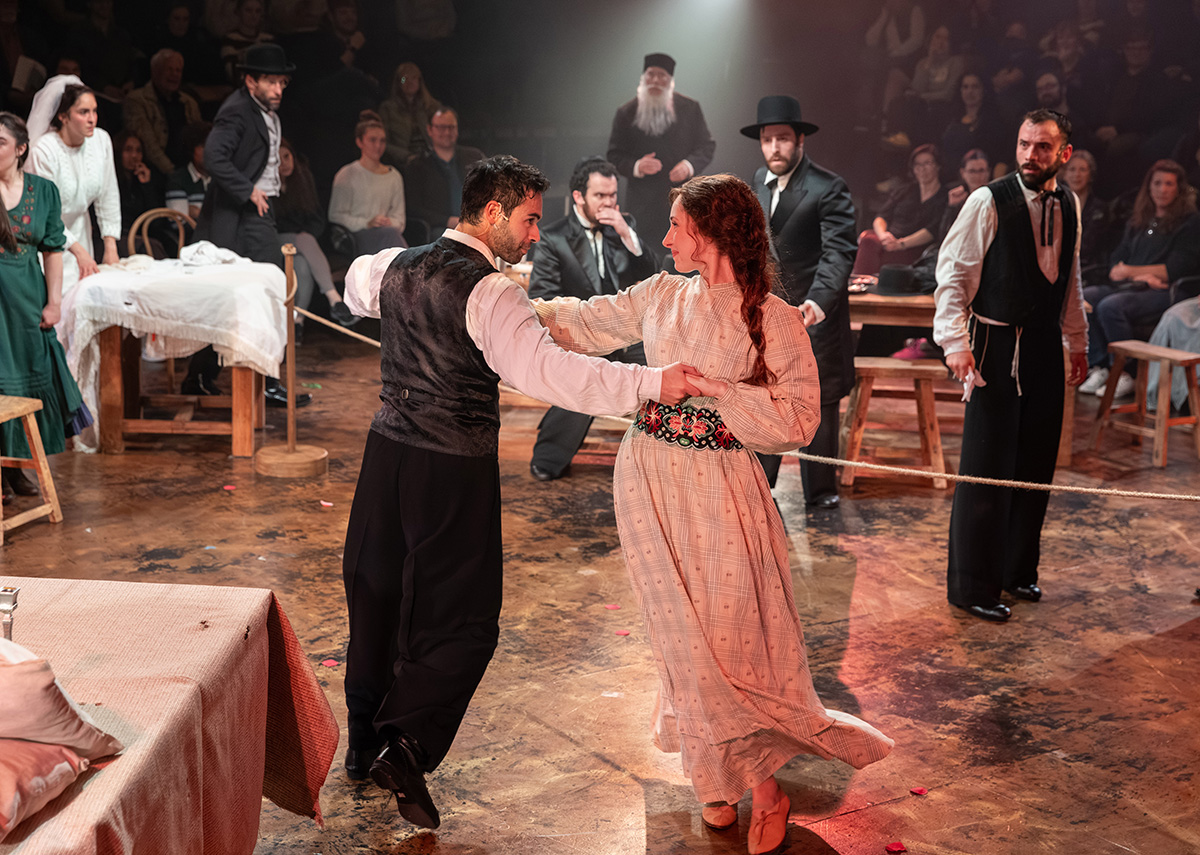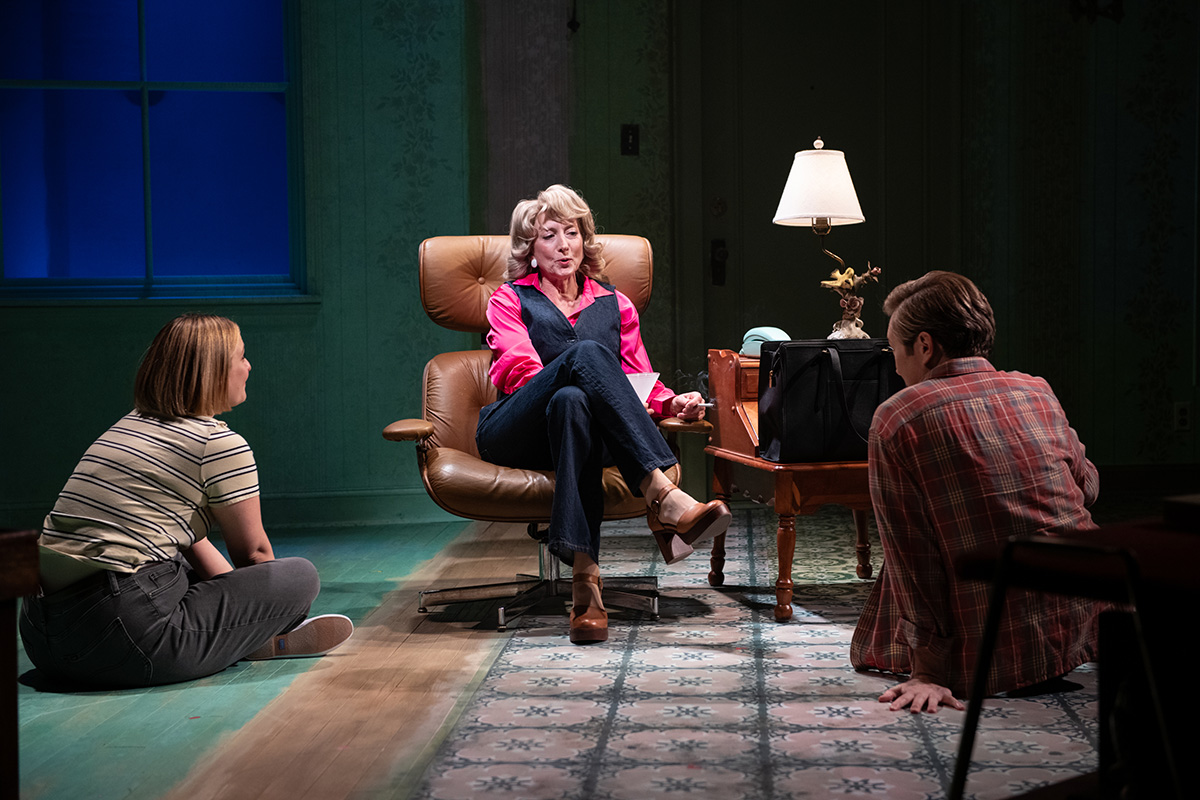Theater
Farewell 14th
After 25 years at Studio, Serge Seiden needed a change


Serge Seiden says he’s found new challenges at Mosaic Theater Company after a long career at Studio. (Photo by Fern Seiden)
It was time to get off 14th Street, says Serge Seiden explaining why after 25 years at Studio Theatre, he left his position as the company’s producing director in August.
“I really needed a change and a new challenge,” he says. “That meant going somewhere else.”
The out director has found that challenge at Mosaic Theater Company, the new company where he recently took on the role of managing director and producer. Helmed by Artistic Director Ari Roth (formerly of Theatre J) and located at Atlas Performing Arts Center on 12th Street, N.E., Mosaic is dedicated to making socially relevant art.
Mosaic’s mission can be described in four watch words, Seiden says. Intercultural – they’re deliberately inclusive. This majority of this season’s roles are for African-American actors. Independent — they make their own money and aren’t beholden to any other organization. Entertaining — though they’ll be producing important works of relevance, it won’t be too heavy. And uncensored — they’re willing to take on all topics.
“My son is biracial so the intercultural part of Mosaic’s mission particularly appeals to me personally,” says Seiden, 52. “I like the idea of trying to make change through theater and I like working with our diverse board members and fund raising which is the managing director component of my job, something I didn’t do at Studio. Mosaic poses new challenges and that’s what I was looking for. It’s the right thing to do.”
The company’s inaugural season opens this week with the world premiere of Jay O. Sanders’ “Unexplored Interior (This is Rwanda: the Beginning and End of the Earth),” the story of a young filmmaker who returns to his native Rwanda to uncover the horrors of his family’s violent demise. It’s staged by Derek Goldman.
January through April, Mosaic presents its “Voices from a Changing Middle East Festival: the War Come Home.” Included in the four productions is “I Shall Not Hate,” a one-man show based on the inspiring international best-selling memoir by Izzeldin Abuelaish, a Palestinian doctor whose young daughters were killed when an Israeli bomb hit their home during Operation Cast Lead.
Seiden is slated to direct Mosaic’s May production of Cori Thomas’ offbeat urban comedy “When January Feels Like Summer.”
Though no longer on staff at Studio, Seiden hasn’t broken all ties with the esteemed company. Studio’s current offering — the final two installments of Richard Nelson’s four-part “Apple Family Cycle” now running in repertory — is directed by Seiden. Titled “Sorry” and “Regular Singing,” they continue the examination of an American family’s highs and lows played out against a changing America.
Though busy at Mosaic, Seiden was eager to complete Nelson’s cycle (he also directed the first two installments). He cites the opportunity to work with a stellar cast which includes Rick Foucheux, Ted van Griethuysen, Kimberly Schraf, Jeremy Web, Elizabeth Pierotti, and out actor Sarah Marshall as a major incentive.
“When you have a cast of this caliber you can work in a deeper way than you’re ordinarily allowed,” he says. “You don’t have to tell them how to do scenes. They know that already. Instead, you’re mostly keeping the room creative and steering the course.”
Set in the family dining room with lots of real food on hand, the plays are steeped realism, a style at which Seiden excels.
“It’s harder than people think,” he says. “What’s not spoken is what’s important. As opposed to plays by Shakespeare where the text is primary, here the audience has to pick up on things that are revealed by other means — the blocking, the business and the looks. A lot of intricate staging is required to pull out what’s underneath.”
Seiden brings a wealth of experience and talent to Mosaic. Over the years at Studio, he advanced from positions as stage manager and literary manager to the role of producing director. He directed 35 productions including “In the Red and Brown Water,” “Souvenir,” “Old Wicked Songs,” “Superior Donuts,” “The Golden Dragon,” “Grey Gardens,” “The Motherfucker With the Hat” and “Bad Jews.” He won a Helen Hayes Award for outstanding director for the musical “Jacques Brel is Alive and Well and Living in Paris” at MetroStage.
While Seiden is grateful to have learned his craft at Studio, he’s invigorated by his new experience at Mosaic.
“I’m excited to be on the ground floor of a new company and I’m enjoying the diversity and vibrancy of Mosaic’s H Street location. It’s a lot like being on 14th Street 15 years ago.”

It’s been a year filled with drama and music, re-imaginings and new works. There was a lot on offer in 2025, and much to enjoy. Here are 10 now-closed productions that come to mind.
On Valentine’s Day at Folger Theatre on Capitol Hill, out actor Holly Twyford served as narrator for “The Love Birds” a Folger Consort work that melds medieval music with a world-premiere composition by acclaimed composer Juri Seo and readings from Geoffrey Chaucer’s “A Parlement of Foules”
Standing behind a podium, Twyford beautifully read Chaucer’s words (translated from Middle English and backed by projected slides in the original language), alternating with music played on old and new instruments.
While Mosaic Theater’s “A Case for the Existence of God,” closed in mid-December, it’s proving a production not soon forgotten. Precisely staged by Danilo Gambini, and impressively acted by Lee Orsorio and Jaysen Wright, the soul-searching two hander by out playwright Samuel D. Hunter, tells the story of two men who form an unlikely friendship based on single-fatherhood, a specific sadness, and hope.
The action unfolds in a small office in southern Idaho, where the pair discuss the perplexing terms of a mortgage loan while delving deep into their lives and backgrounds. Nothing is left off the table.
Shakespeare Theatre Company’s spring production of “Uncle Vanya” gave audiences something both fresh yet enduring. Staged by STC’s artistic director Simon Godwin, the production put an impeccably pleasing twist on Russian playwright Anton Chekhov’s classic. It ranks among the very best area productions of the year.
Featuring a topnotch cast led by Hugh Bonneville (TV’s “Downton Abbey”) in the title role, the play was set on an unfinished stage cluttered with costume racks and assorted props, all assembled by crew uniformed in black and actors in street clothes. Throughout the drama tinged with comedy, the actors continued to assist with ever increasingly period set changes accompanied by an underscore of melancholic cello strings. It was innovative and wonderful.
GALA Hispanic Theatre’s production of Manuel Puig’s “Kiss of the Spider Woman” was an intimate and affecting piece of theater. Staged by José Luis Arellano, it starred out actors Rodrigo Pedreira and Martín Ruiz as two very different men whose paths cross as convicts in an Argentine prison.
Arena Stage scored with a re-imagined and updated take on the widely liked musical “Damn Yankees.” Directed by Sergio Trujillo, the Broadway bound production has been “gently re-tooled for its first major revival in the 21st century,” moving the action from the struggling Washington Senators baseball team to the turn-of-the-century Yankees lineup. Ana Villafañe’s charmingly seductive Lola and a chorus of fit ball players made for a good time.
Also at Arena, out playwright Reggie D. White’s new work “Fremont Ave.” was very well received. A semi-autobiographical glimpse into home and the many definitions of that idea specifically relating to three generations of Black men, the work boasts a third act with a deeply queer storyline to boot.
Before his smash hit “Hamilton” transformed Broadway, Lin-Manuel Miranda wrote “In the Heights,” a seminal musical set against the vicissitudes of an upper Manhattan bodega. Infused with hip-hop, rap, and pop ballads, the romance/dramedy takes place over a lively few days in the vibrant, close-knit Latin neighborhood, Washington Heights.
Signature Theatre’s exciting take on “In the Heights” featured a talented cast including out actor Ángel Lozado as the bodega owner who figures prominently in the barrio and the action.
Studio Theatre’s recent production of lesbian playwright Paula Vogel’s newest work “The Mother Play,” a drama with humor, is about a well put together alcoholic mother and her two gay children living under difficult circumstances in the less glitzy parts of suburban Maryland. With nuanced performances and smart direction, the production was terrific.
Keegan Theatre surpassed expectations with its production of “Lizzie” a punk rock opera about Miss Borden, the fabled axe wielding title character. Performed by a super all-female cast, they belted a score that hits hard on subjects like money, queerness, and strained (to say the least) family relationships.
Round House Theatre impressed autumn audiences with “The Inheritance,” a two-part drama sensitively staged by out director Tom Story and acted by a mostly queer cast that included young actor Jordi Bertrán Ramírez in a breakout performance.
Penned by out playwright Matthew López, the epic work inspired by E.M. Forster’s novel “Howards End,” explores themes of love, legacy, and the AIDS crisis through the lives of three generations of gay men in New York City.
Prior to opening, Story commented that with the production’s predominately queer cast you get actors who “really understand the situation, the humor, and the struggle. It works well.” And he was right.
Theater
Out actor talks lead role in ‘Fiddler on the Roof’
Signature Theatre production runs through Jan. 25

‘Fiddler on the Roof’
Through Jan. 25
Signature Theatre
4200 Campbell Ave.
Arlington, Va.
Tickets start at $47
Sigtheatre.org
Out actor Ariel Neydavoud is deep into a three-month run playing revolutionary student Perchick in the beloved 1964 musical “Fiddler on the Roof” at Signature Theatre in Arlington. And like his previous gigs, it’s been a learning experience.
This time, he’s gleaning knowledge from celebrated gay actor Douglas Sills who’s starring as the show’s central character Tevya, a poor Jewish milkman in the fictional village of Anatevka in tsarist Russia circa 1905.
In addition to anti-Semitism and expulsion, Tevya is struggling with waning traditions in a changing world where his daughters dare suggest marrying for love. Daughter Hodel (Lily Burka) falls for Perchick, an outsider who comes to town brandishing new ideas.
And along with its compelling and humor filled storyline, “Fiddler” boasts iconic numbers like “If I Were a Rich Man,” “Tradition,” “Matchmaker, Matchmaker,” and “Sunrise, Sunset.”
Neydavoud, born and raised as an only child in the West Los Angeles neighborhood lightheartedly referred to as Tehrangeles (due to the large Iranian-American population), has always been passionate about performing. “It’s like I came out of the womb tap dancing,” he says. Fortunately, his mother, an accomplished pianist and composer, served as built-in accompanist.
He began acting and singing at kid camps and a private Jewish middle school alongside classmate Ben Platt. In his teens, Neydavoud spent three glorious weeks at Stagedoor Manor, a well-known theater camp in Upstate New York, where he solidified his desire to pursue theater as a profession, and started to feel comfortable with being queer.
Following high school, he studied at AMDA (American Musical and Dramatic Academy) and soon after morphed from theater student to professional actor.
WASHINGTON BLADE: Your entry into showbiz seems to have been a smooth one.
ARIEL NEYDAVOUD: I’m happy to hear it seems that way. I’d rarely describe anything about this profession as smooth; nonetheless, what I love about this work is that it gives opportunities to have so many new experiences: new shows, new parts, and new communities who come together in a moment’s notice purely for the sake of creating art.
BLADE: Tell us about Perchick.
NEYDAVOUD: He comes to Anatevka and challenges their ideals and way of life. That’s something I can relate to.
I’m Jewish on both sides, but I’m also queer, first generation American, [his mother and father are from Germany and Iran, respectively], and a person of color. I never feel like I belong to a single community. That’s what has emboldened my inner activist to speak up and challenge ideas that I don’t necessarily buy into.
BLADE: You sing beautifully. Perchick’s song is “Now I have Everything,” an Act II melody about finding love. Was it an instant fit for you?
NEYDAVOUD: Not instantly.I’m traditionally a first tenor. Perchick is baritone range, a little outside of my comfort zone. After being cast, I asked our director Joe Calarco if he would be comfortable raising the key, something they did with the recent Broadway revival. He was firm about not doing that.
As an artist I see challenges as opportunities to grow, so it’s been really good exploring my lower register.
BLADE: Audiences have commented on an intimacy surrounding this production.
TK: It’s performed in the round with a dining table at its center. It could be a sabbath or seder table, however you interpret it, but I find it a brilliant way to illustrate community and tradition.
It feels like the audience is invited to the table and join the residents of Anatevka. The show’s moments of joy like the betrothal song “To Life (L’Chaim)” are intensified, and conversely the pogrom scenes are made more difficult. It feels like we’re sharing space.
BLADE: Do your encompassing identities broaden casting possibilities for you?
NEYDAVOUD: Marketing yourself as ethnically ambiguous can be a helpful tool. After “Hamilton” and the pandemic there was more of a shift toward authenticity. I try to steer toward playing Middle Eastern, Southwest Asian, Jewish, and mixed-race characters without being too prescriptive.
BLADE: Tell us your dream roles?
NEYDAVOUD: I’d love to play the Emcee in Cabaret [often portrayed as a gender-fluid, queer-coded, or non-binary figure]. And I’d like to direct a production of “Godspell” with a fully Middle Eastern cast. I think portraying Jesus and disciples in Middle Eastern bodies as Bohemian idealists living under an oppressive regime could be especially impactful.
BLADE: Can today’s queer audiences relate to life on the shtetl?
NEYDAVOUD: As a piece, “Fiddler” is timeless. Beyond the magical score, it hits home with just about anyone who’s ever felt othered. There are relevant themes of displacement and persecution, and maintaining cultural identity in the wake of turbulence, all ideas that tend to resonate with queer people.
Theater
Studio’s ‘Mother Play’ draws from lesbian playwright’s past
A poignant memory piece laced with sadness and wry laughs

‘The Mother Play’
Through Jan. 4
Studio Theatre
1501 14th St., N.W.
$42 – $112
Studiotheatre.org
“The Mother Play” isn’t the first work by Pulitzer Prize-winning lesbian playwright Paula Vogel that draws from her past. It’s just the most recent.
Currently enjoying an extended run at Studio Theatre, “The Mother Play,” (also known as “The Mother Play: A Play in Five Evictions,” or more simply, “Mother Play”) is a 90-minute powerful and poignant memory piece laced with sadness and wry laughs.
The mother in question is Phyllis Herman (played exquisitely by Kate Eastwood Norris), a divorced government secretary bringing up two children under difficult circumstances. When we meet them it’s 1964 and the family is living in a depressing subterranean apartment adjacent to the building’s trash room.
Phyllis isn’t exactly cut out for single motherhood; an alcoholic chain-smoker with two gay offspring, Carl and Martha, both in their early teens, she seems beyond her depth.
In spite (or because of) the challenges, things are never dull in the Herman home. Phyllis is warring with landlords, drinking, or involved in some other domestic intrigue. At the same time, Carl is glued to books by authors like Jane Austen, and queer novelist Lytton Strachey, while Martha is charged with topping off mother’s drinks, not a mean feat.
Despite having an emotionally and physically withholding parent, adolescent Martha is finding her way. Fortunately, she has nurturing older brother Carl (the excellent Stanley Bahorek) who introduces her to queer classics like “The Well of Loneliness” by Radclyffe Hall, and encourages Martha to pursue lofty learning goals.
Zoe Mann’s Martha is just how you might imagine the young Vogel – bright, searching, and a tad awkward.
As the play moves through the decades, Martha becomes an increasingly confident young lesbian before sliding comfortably into early middle age. Over time, her attitude toward her mother becomes more sympathetic. It’s a convincing and pleasing performance.
Phyllis is big on appearances, mainly her own. She has good taste and a sharp eye for thrift store and Goodwill finds including Chanel or a Von Furstenberg wrap dress (which looks smashing on Eastwood Norris, by the way), crowned with the blonde wig of the moment.
Time and place figure heavily into Vogel’s play. The setting is specific: “A series of apartments in Prince George’s and Montgomery County from 1964 to the 21st century, from subbasement custodial units that would now be Section 8 housing to 3-bedroom units.”
Krit Robinson’s cunning set allows for quick costume and prop changes as decades seamlessly move from one to the next. And if by magic, projection designer Shawn Boyle periodically covers the walls with scurrying roaches, a persistent problem for these renters.
Margot Bordelon directs with sensitivity and nuance. Her take on Vogel’s tragicomedy hits all the marks.
Near the play’s end, there’s a scene sometimes referred to as “The Phyllis Ballet.” Here, mother sits onstage silently in front of her dressing table mirror. She is removed of artifice and oozes a mixture of vulnerability but not without some strength. It’s longish for a wordless scene, but Bordelon has paced it perfectly.
When Martha arranges a night of family fun with mom and now out and proud brother at Lost and Found (the legendary D.C. gay disco), the plan backfires spectacularly. Not long after, Phyllis’ desire for outside approval resurfaces tenfold, evidenced by extreme discomfort when Carl, her favorite child, becomes visibly ill with HIV/AIDS symptoms.
Other semi-autobiographical plays from the DMV native’s oeuvre include “The Baltimore Waltz,” a darkly funny, yet moving piece written in memory of her brother (Carl Vogel), who died of AIDS in 1988. The playwright additionally wrote “How I Learned to Drive,” an acclaimed play heavily inspired by her own experiences with sexual abuse as a teenager.
“The Mother Play” made its debut on Broadway in 2024, featuring Jessica Lange in the eponymous role, earning her a Tony Award nomination.
Like other real-life matriarch inspired characters (Mary Tyrone, Amanda Wingfield, Violet Weston to name a few) Phyllis Herman seems poised to join that pantheon of complicated, women.
-

 District of Columbia5 days ago
District of Columbia5 days agoImperial Court of Washington drag group has ‘dissolved’
-

 Colombia4 days ago
Colombia4 days agoGay Venezuelan man who fled to Colombia uncertain about homeland’s future
-

 Arts & Entertainment4 days ago
Arts & Entertainment4 days ago2026 Most Eligible LGBTQ Singles nominations
-

 District of Columbia4 days ago
District of Columbia4 days agoKennedy Center renaming triggers backlash




















